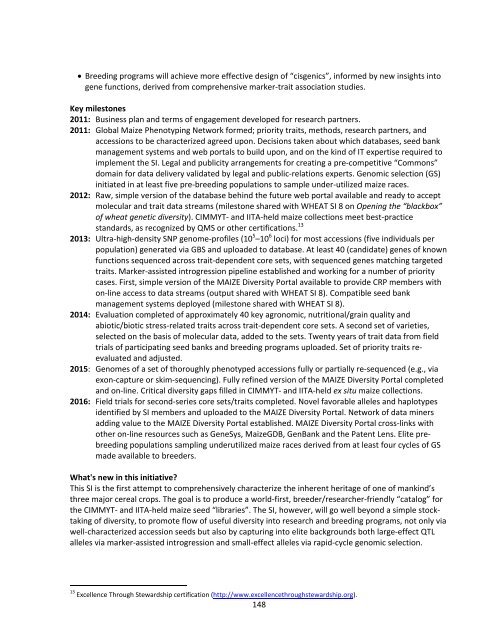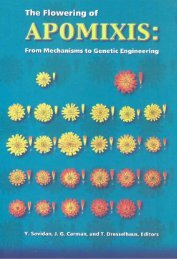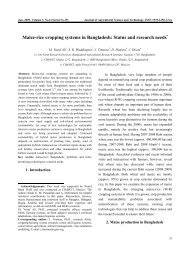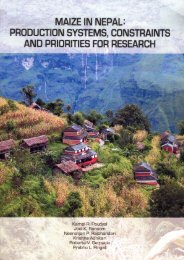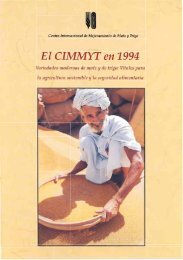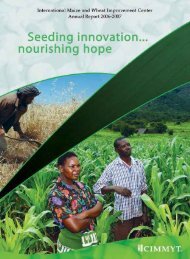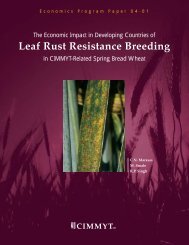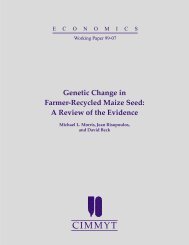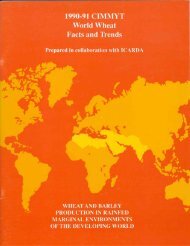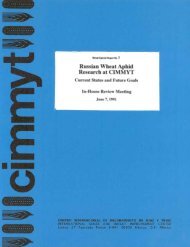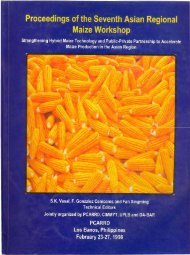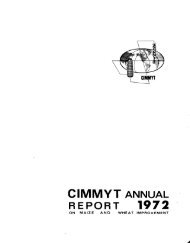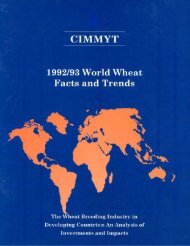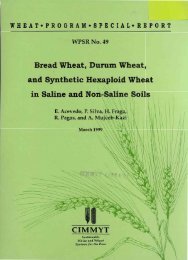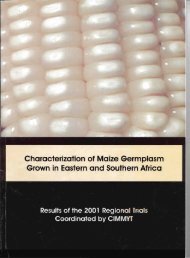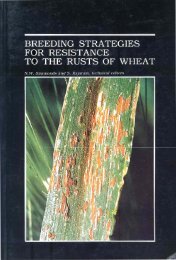Download - Maize
Download - Maize
Download - Maize
Create successful ePaper yourself
Turn your PDF publications into a flip-book with our unique Google optimized e-Paper software.
Breeding programs will achieve more effective design of “cisgenics”, informed by new insights into<br />
gene functions, derived from comprehensive marker‐trait association studies.<br />
Key milestones<br />
2011: Business plan and terms of engagement developed for research partners.<br />
2011: Global <strong>Maize</strong> Phenotyping Network formed; priority traits, methods, research partners, and<br />
accessions to be characterized agreed upon. Decisions taken about which databases, seed bank<br />
management systems and web portals to build upon, and on the kind of IT expertise required to<br />
implement the SI. Legal and publicity arrangements for creating a pre‐competitive “Commons”<br />
domain for data delivery validated by legal and public‐relations experts. Genomic selection (GS)<br />
initiated in at least five pre‐breeding populations to sample under‐utilized maize races.<br />
2012: Raw, simple version of the database behind the future web portal available and ready to accept<br />
molecular and trait data streams (milestone shared with WHEAT SI 8 on Opening the “blackbox”<br />
of wheat genetic diversity). CIMMYT‐ and IITA‐held maize collections meet best‐practice<br />
standards, as recognized by QMS or other certifications. 13<br />
2013: Ultra‐high‐density SNP genome‐profiles (10 5 –10 6 loci) for most accessions (five individuals per<br />
population) generated via GBS and uploaded to database. At least 40 (candidate) genes of known<br />
functions sequenced across trait‐dependent core sets, with sequenced genes matching targeted<br />
traits. Marker‐assisted introgression pipeline established and working for a number of priority<br />
cases. First, simple version of the MAIZE Diversity Portal available to provide CRP members with<br />
on‐line access to data streams (output shared with WHEAT SI 8). Compatible seed bank<br />
management systems deployed (milestone shared with WHEAT SI 8).<br />
2014: Evaluation completed of approximately 40 key agronomic, nutritional/grain quality and<br />
abiotic/biotic stress‐related traits across trait‐dependent core sets. A second set of varieties,<br />
selected on the basis of molecular data, added to the sets. Twenty years of trait data from field<br />
trials of participating seed banks and breeding programs uploaded. Set of priority traits reevaluated<br />
and adjusted.<br />
2015: Genomes of a set of thoroughly phenotyped accessions fully or partially re‐sequenced (e.g., via<br />
exon‐capture or skim‐sequencing). Fully refined version of the MAIZE Diversity Portal completed<br />
and on‐line. Critical diversity gaps filled in CIMMYT‐ and IITA‐held ex situ maize collections.<br />
2016: Field trials for second‐series core sets/traits completed. Novel favorable alleles and haplotypes<br />
identified by SI members and uploaded to the MAIZE Diversity Portal. Network of data miners<br />
adding value to the MAIZE Diversity Portal established. MAIZE Diversity Portal cross‐links with<br />
other on‐line resources such as GeneSys, <strong>Maize</strong>GDB, GenBank and the Patent Lens. Elite prebreeding<br />
populations sampling underutilized maize races derived from at least four cycles of GS<br />
made available to breeders.<br />
What's new in this initiative?<br />
This SI is the first attempt to comprehensively characterize the inherent heritage of one of mankind’s<br />
three major cereal crops. The goal is to produce a world‐first, breeder/researcher‐friendly “catalog” for<br />
the CIMMYT‐ and IITA‐held maize seed “libraries”. The SI, however, will go well beyond a simple stocktaking<br />
of diversity, to promote flow of useful diversity into research and breeding programs, not only via<br />
well‐characterized accession seeds but also by capturing into elite backgrounds both large‐effect QTL<br />
alleles via marker‐assisted introgression and small‐effect alleles via rapid‐cycle genomic selection.<br />
13 Excellence Through Stewardship certification (http://www.excellencethroughstewardship.org).<br />
148


